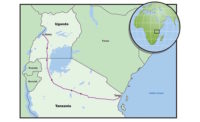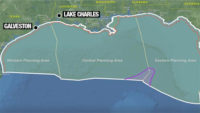Qatar Petroleum, a state-owned Qatar company, has for the second time been picked as preferred bidder for the construction of a $2-billion oil refinery in Tunisia’s port of Skhira.
The 30-year, build-own-operate-transfer contract for the 120,000-barrels-per-day greenfield refinery, located 350 kilometers from the capital Tunis, was signed in May in Tunis by representatives of the governments of Tunisia and Qatar. The refinery’s capacity eventually will be increased to 150,000 bpd.
The facility will include processing units, storage and offices and has the potential to generate 1,200 jobs. AT ENR press time, Qatar Petroleum had not responded to queries about the installation of refinery units and whether subcontractors will be involved. Tunisian officials did not reply to e-mailed questions regarding financing.
However, according to a press release by the Ministry of Development and International Cooperation, the completed refinery will “produce lead-free benzene, LPG, diesel fuel and kerosene for aircraft.”
The refinery will break ground by the end of 2012 and be completed by 2015, according to Industry Minister Mohammed Lamine Chakhari.
Constructing a refinery at Skhira port is strategic. The 100-hectare project site has infrastructure for storing and conveying refined oil products. There is a port terminal to accommodate tankers of up to 120,000 tons. The storage facility at the terminal has a capacity for 350,000 tons. Currently, the oil pipeline conveying fuel to Italy through Tunisia passes through Skhira. It has a daily capacity of 38,000 tonnes.
Qatar Petroleum was first awarded the contract for constructing the refinery in 2007 under a joint venture with Britain’s Petrofac Ltd. However, construction was put on hold a year later because of fluctuating project costs, the developers said.
Another attempt to revive construction of the refinery was made in 2010, when the then ruler of Tunisia, Zine al-Abidine Ben Ali, and the then leader of Libya, Muammar Gaddafi, announced Libya would finance the project. No details were given at the time on the specific role Libya would play on the project or the amount the Gaddafi government planned to invest. That deal collapsed when both leaders were overthrown during the unrest of the Arab Spring in 2011.
Tunisia anticipates a drop in oil and gas imports once the refinery is completed. After the state-run 34,000-bpd facility at Bizerte, it will be the country’s largest refinery.
Gas-fired turbines generate 72% of Tunisia’s electricity, and the country must import natural gas from Algeria through the Trans-Mediterranean pipeline to meet demand, a circumstance that has led to a desire to increase domestic production. Tunisia produces an estimated 83,000 bpd of oil and 2.97 billion cubic meters of gas per day—60% of it by the BG Group through BG's Miskar and Hasdrubal facilities.
Tunisia and other countries in the Middle East and North Africa (MENA) region will require foreign government partners to provide financial assistance for economic transformation because their needs are too great for private markets, according to the International Monetary Fund.
“In 2012 and 2013, gross external and fiscal financing needs of MENA oil importers are projected at about US$90 billion and US$100 billion, respectively. Capital markets are likely to provide only part of these funds, and timely official financing will be critical,” IMF says in its regional economic outlook for April 2012.



Post a comment to this article
Report Abusive Comment